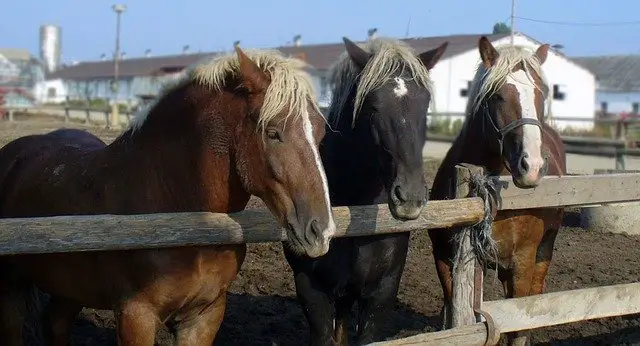Last Updated on February 21, 2022 by Allison Price
Horses and cattle are often found peacefully grazing together all over the world. Although it is common, it may not be the best thing for your horse’s well-being.
Kathleen Crandell (Ph.D.), a nutritionist at Kentucky Equine Research (KER), said, “Not to worry!”
Both species are herbivores so horses and cattle can eat the same grasses. However, their anatomy differences dictate which stands of grass they graze, at the very least, in terms of plant maturity.
Crandell explained that horses have both the upper and lower arcades of teeth . This allows them to easily pick up taller grasses with ease or nip them. Cattle have no upper incisors which hinders their ability tear grass at ground-level. Instead, they grab taller grass with their tongues and then tear it when it is pinched by the lower and upper jaws.
Horses tend to be inconsistent in their grazing habits, undergrazing some areas and overgrazing others. Cattle are more selective and will often graze areas horses won’t. It is advantageous to graze both species together, as there will be more forage and less mowing.
Horses and cattle are not susceptible to the same parasites. Therefore, grazing them together will not increase their parasite burden. Crandell advised that horses should discuss with their veterinarian the appropriate deworming protocol to eliminate parasites prevalent in their system.

While both cattle and horses are good pasturemates, there are a few things you should know.
- Because of its hardiness, fescue is often used as forage by cattle. Although many horses can graze Fescue with no problems, it is not suitable for broodmares in late gestation. Common endophyte infected fescue can cause reproductive problems in mares. This includes prolonged pregnancies, thickened placesntas and difficult births. Crandell stated that fescue is not a problem for most horses but is an absolute no-go in broodmare nutrition.
- Cattle and horses might need to be separated if they are given a concentrated source of energy, such as a grain mixture. Horses can be poisoned by many additives in cattle feeds. It is not a good idea to feed cattle feeds to horses.
- There are different requirements for fencing depending on the species. Although cattle can be contained with barbed wire fencing, horses should not be enclosed as it can cause severe injuries.


